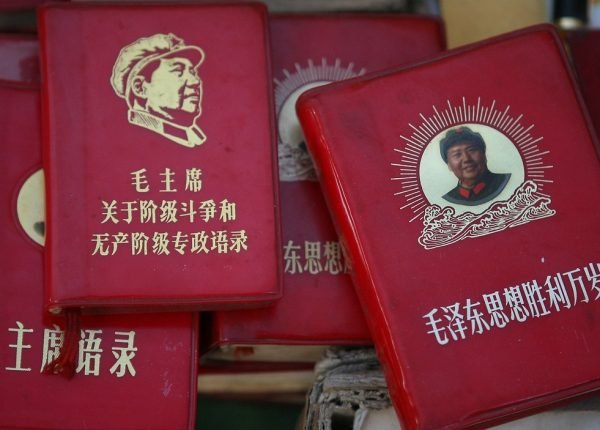By FU MI
Correspondent
HWANGE, Zimbabwe — When the once-quiet village of Hwange saw its coal mine bought by Golden Future Energy, a Chinese state-backed coal firm, local miner Umukobwa Tshuma had only one question: “What does this mean for my lunch break?”
Initially reassured by promises of job stability and “shared prosperity,” Tshuma was soon introduced to a new reality—one filled with dust, slogans, and mandatory Communist study sessions. The visiting Chinese managers arrived not just with mining equipment but also with a well-thumbed stack of The Little Red Book, explaining that understanding Mao Zedong Thought would “elevate” the workforce.
“We began our shift each morning reciting, ‘Political power grows out of the barrel of a gun.’ Except in our case, it grows out of this horrible shovel,” Tshuma said while adjusting his tattered gloves. “I asked if we could grow our paychecks out of the barrel of a gun, and they told me I ‘lacked revolutionary discipline.’”
Workers of the World Unite—and Then Wait for a Third Party Member
Golden Future Energy’s Chinese management had explicit orders from Beijing to establish a Formal Party Cell at the Hwange site. This was not a trivial task: Party recognition required at least three committed members, but initial efforts only secured the loyalty of two individuals—Comrade Manager Li and Comrade Security Guard Wu.

Weeks passed. Recruitment flyers offering “free rice and dialectical materialism” attracted little interest. Tshuma’s refusal to join was particularly galling to the managers. “They told me, ‘The masses are the real heroes, while we ourselves are often childish and ignorant.’ And I said, ‘Exactly! Which is why I’m not joining!’”
Finally, local villager Gisabo, intrigued by rumors of free monthly snacks, signed up as the third member. The Hwange Party Cell was born—and with its birth came a flood of additional resources, including Party flags, posters, and a mysterious budget line item labeled “environmental optimization,” which locals say has yet to manifest.
The Bigger the Mine, the Redder the Sky
Under Party guidance, the mine expanded at an alarming rate, engulfing farmland, polluting local rivers, and driving Hwange’s famed elephants further afield. The air, once fresh and filled with birdsong, now carried the distinct aroma of sulfur and dashed dreams.
Tourists, who once flocked to Hwange National Park, began avoiding the area. “Mao said, ‘The people, and the people alone, are the motive force in the making of world history,’” Tshuma explained bitterly, waving at the smoke-spewing plant. “But I think he forgot about elephants. They used to be a big draw.”
Despite his growing disdain, Tshuma found himself increasingly drawn into the Party’s orbit. Attendance at Party meetings became mandatory. There, he and his fellow miners chanted lines from The Little Red Book with the enthusiasm of men who knew their monthly paychecks depended on it.

“I tried quoting Adam Smith once,” Tshuma recalled. “They made me rewrite The Wealth of Nations as The Health of Collective Struggle. I still don’t know what that means.”
When Capitalism Fails, Blame Capitalism
As the mine grew, so did Tshuma’s disillusionment. Local infrastructure crumbled under the weight of trucks, crops wilted in polluted soil, and respiratory ailments soared. Yet the Party insisted this was all part of the dialectical process. “They told us, ‘The socialist system will eventually replace the capitalist system; this is an objective law independent of man’s will.’ I asked if that law could also replace my water filter.”
Even as he questioned the system, Tshuma found himself internalizing its logic. “At first, I resisted,” he admitted. “But now, when I see the fish dying in the river, I think, ‘Well, they’re making their sacrifice for the proletariat.’ And that’s deeply concerning to me.”
Towards a Brighter, Smoggier Future
Today, Tshuma works longer hours than ever, his once-proud free-market ideals buried somewhere beneath the coal dust. “I used to believe in personal enterprise,” he said, staring wistfully at the horizon, now obscured by smog. “But now, I’ve realized: if we’re all equally miserable, that’s equality.”
Golden Future Energy recently announced plans to expand its operations further into Hwange National Park, promising that their Party Cell would guide the effort with “uncompromising revolutionary purity.” Tshuma, now a reluctant Party member, has been promoted to “Deputy Vice Chair of Thought Struggle.”
“They said it’s a position of honor,” Tshuma mused. “But I’m still using the same broken shovel. At least Mao would have understood that part.”
As the mine grows and the village shrinks, Tshuma clings to one small hope: that one day, perhaps, he’ll retire and open a small business selling air filters. “I’ll call it The Invisible Hand.” But for now, he picks up his shovel and returns to work, quoting Mao under his breath: “Let a hundred flowers bloom; let a hundred schools of thought contend.”
“The problem,” Tshuma says with a sigh, “is that the flowers are dead, and the schools are all teaching Maoism.”
Got a tip? Contact us at cds@chinadailyshow.net
Follow this and other leading China news at @chinadailyshow on Twitter
